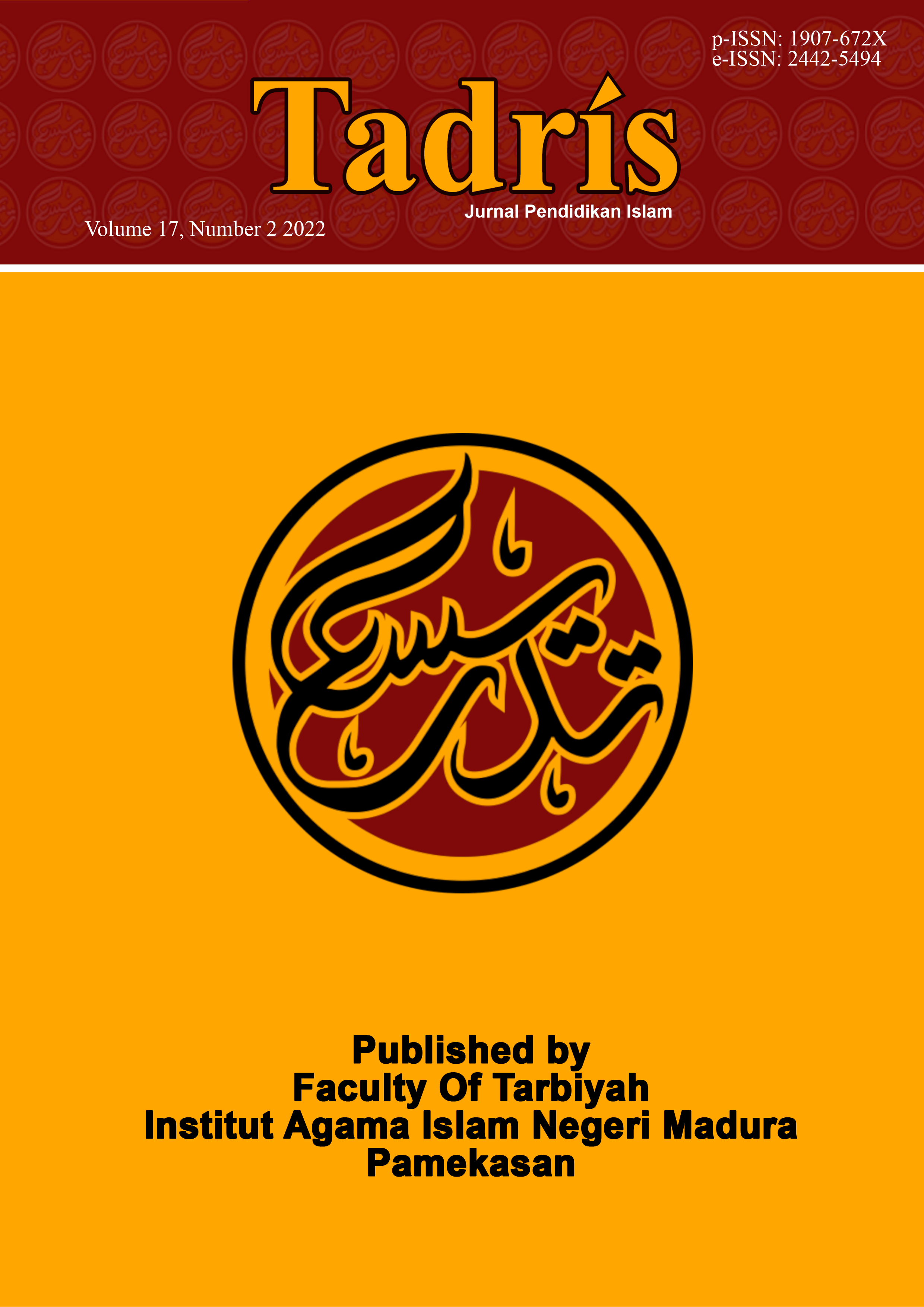Religious-Nationalism Based Character Education in Traditional Pesantren
 Abstract views: 290
,
Abstract views: 290
,
 PDF downloads: 249
PDF downloads: 249
Abstract
This research was motivated by the rise of accusations of radicalization through Islamic educational institutions, especially traditional pesantren. The learning process in traditional pesantren that seem unable to train students' critical thinking skills is considered a factor in the ease with which radicalism grows in these institutions. This study aims to determine how the implementation of religious-nationalism-based character education in traditional pesantren. The focus of the research is on nationalism-religious character education in learning materials and pesantren culture. This type of research is a mix-method research with field research techniques. The data were collected by means of documentation, interviews and questionnaires. The questionnaire is quantitative data which is analyzed with a qualitative paradigm. These data are sourced from three traditional Islamic boarding schools in Padang. The results of this study conclude that nationalism-religious-based character education in traditional Pesantren is applied in moral learning materials that refer to the kitab kuning and Islamic religious subject textbooks. In addition, nationalist-religious character education is also developed through a pesantren culture which is thick with the values of love for the homeland, unity, tolerance, and democracy. This conclusion is supported by the nationalist-religious attitude of the majority of santri in traditional pesantren. The results of this study strengthen the conclusions of previous studies which stated that Islamic boarding schools teach an accommodative, pluralist attitude and reject radicalism.
Downloads
References
Abdul Majid dan Dian Andayani. Pendidikan Karakter Perspektif Islam. bandung: PT. Remaja Rosdakarya, 2013.
Al-Abrasyi, Muhammad ‘Athiyah. Prinsip-Prinsip Dasar Pendidikan Islam. Bandung: Pustaka Setia, 2003.
Ayub Mursalin dan Ibnu Katsir. “Pola Pendidikan Keagamaan Pesantren Dan Radikalisme: Studi Kasus Pesantren-Pesantren Di Provinsi Jambi.” Kontekstualita 25, no. 2 (2010): 257.
Bizawie, Zainul Milal. Laskar Ulama-Santri Dan Resolusi Jihad Garda Depan Menegakkan Indonesia (1945-1949). Jakarta: Pustaka Compas, 2014.
Departemen Pendidikan Nasional. “Undang-Undang Sistem Pendidikan Nasional No. 20 Tahun 2003.” 2003.
Detiknews. “Maarif Institute: Guru Juga Faktor Utama Radikalisme Di Sekolah.” Detiknews, 2021. https://news.detik.com/berita/d-3834511/maarif-institute-guru-juga-faktor-utama-radikalisme-di-sekolah.
“Dokumentasi Profil.” 2021.
Hanafi, Muhammad. “Kedudukan Musyawarah Dan Demokrasi Di Indonesia.” Jurnal Cita Hukum 1, no. 2 (2013): 227–46.
Ismail Sukardi. “Character Education Based on Religious Values: An Islamic Perspective.” A’dib: Journal of Islamic Education 21, no. 1 (2016): 50–51.
Johansyah. “Pendidikan Karakter Dalam Islam: Kajian Dari Aspek Metodologis.” Jurnal Ilmiah Islam Futura 11, no. 1 (2011): 96.
Lickona, Thomas. Educating for Character: How Our School Can Teach Respect and Responsibility. York: Bantam books, 1991.
M. Imamuddin Rahmat. Arus Baru Islam Radikal: Transmisi Revivalisme Islam Timur Tengah Ke Indonesia. Jakarta: Erlangga, 2007.
M.W. Berkowitz, dan M.C. Bier. What Works In CharacterEducation: A Research-Driven Guide for Educators. Washington DC: Univesity of MissouriSt Louis, 2005.
Martiany, Dina. “Persepsi Kalangan Pesantren Terhadap Relasi Perempuan Dan Laki-Laki.” Aspirasi 8 (2017): 29–41.
Penyusun, Tim. Ensiklopedi Nasional Indonesia. Jakarta: Cipta Adi Pustaka, 1990.
Shulhan. “Transformasi Modernisasi Pesantren Salaf.” Jurnal Perspektif 14, no. 2 (2021): 327–28.
Sitompul, Einar Martahan. NU Dan Pancasila: Sejarah Dan Peranan NU Dalam Perjuangan Umat Islam Di Indonesia Dalam Rangka Penerimaan Pancasila Sebagai Satu-Satunya Asas. Jakarta: Jakarta, 1996.
Syaltut, Mahmud. Akidah Dan Syari’ah Islam. Jakarta: PT Bina Aksara, 1985.
Wahjoetomo. Perguruan Tinggi Pesantren, Pendidikan Alternatif Masa Depan. Jakarta: Gema Insani Press, 1997.
Wakid, Mohammad Abdul. “Budaya Pesantren Dan Pendidikan Karakter Di SMP Plus Miftahul Ulum Sukowiyono Karangrejo.” Media Bina Ilmiah 15, no. 5 (2020): 4556.
“Wawancara: Pembina Asrama Putri.” 2021.
“Wawancara WK Kurikulum Ponpes Darul Ulum,” 2021.
“Wawancara WK Kurikulum Ponpes Lubuk Begalung.” 2021.
William Liddle. “Skripturalisme Media Dakwah: Suatu Bentuk Pemikiran Dan Aksi Politik Islam Di Indonesia Masa Orde Baru.” In Jalan Baru Islam, Memetakan Paradigma Mutakhir Islam Indonesia, edited by Mark R. Woodward. Bandung: Mizan, 1999.
Copyright (c) 2022 TADRIS: Jurnal Pendidikan Islam

This work is licensed under a Creative Commons Attribution-NonCommercial 4.0 International License.
The journal operates an Open Access policy under a Creative Commons Non-Commercial 4.0 International license. Authors who publish with this journal agree to the following terms:
- Authors retain copyright and grant the journal right of first publication with the work simultaneously licensed under a
 Commons Attribution-NonCommercial 4.0 International License
Commons Attribution-NonCommercial 4.0 International Licensethat allows others to share — copy and redistribute the material in any medium or format, and adapt — remix, transform, and build upon the material.
- Authors are able to enter into separate, additional contractual arrangements for the non-exclusive distribution of the journal's published version of the work (e.g., post it to an institutional repository or publish it in a book), with an acknowledgement of its initial publication in this journal.
- Authors are permitted and encouraged to post their work online (e.g., in institutional repositories or on their website) prior to and during the submission process, as it can lead to productive exchanges, as well as earlier and greater citation of published work (see The Effect of Open Access).














